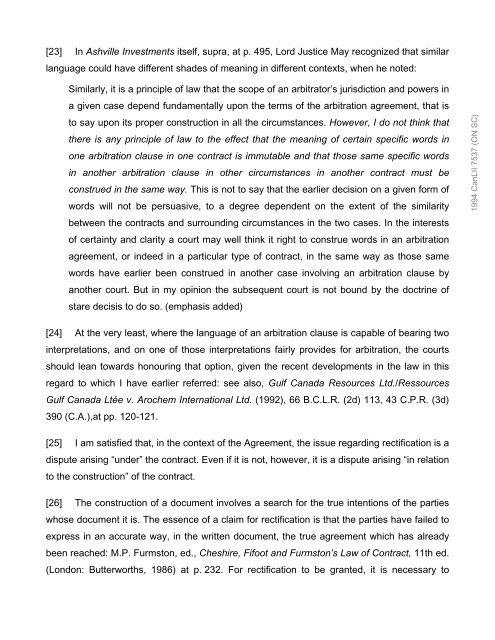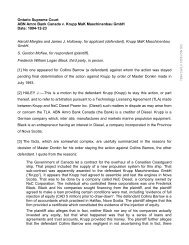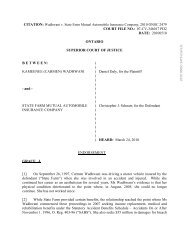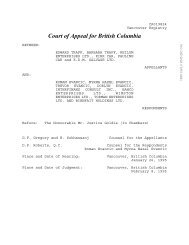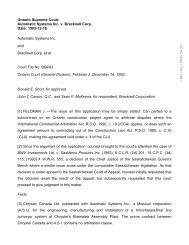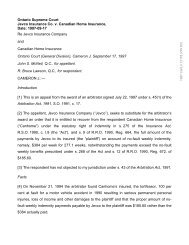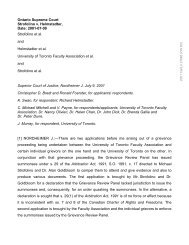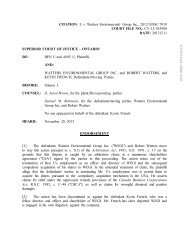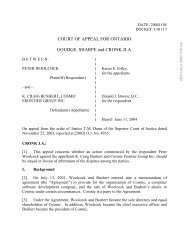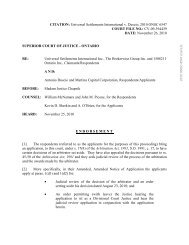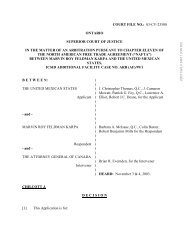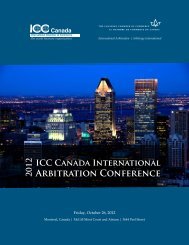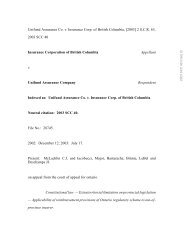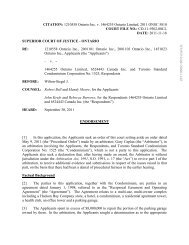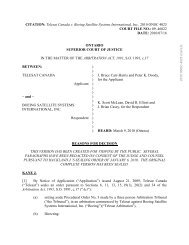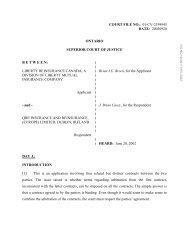Onex Corp v Ball Corp 1994 CanLII 7537 - Arbitration Place
Onex Corp v Ball Corp 1994 CanLII 7537 - Arbitration Place
Onex Corp v Ball Corp 1994 CanLII 7537 - Arbitration Place
Create successful ePaper yourself
Turn your PDF publications into a flip-book with our unique Google optimized e-Paper software.
[23] In Ashville Investments itself, supra, at p. 495, Lord Justice May recognized that similar<br />
language could have different shades of meaning in different contexts, when he noted:<br />
Similarly, it is a principle of law that the scope of an arbitrator’s jurisdiction and powers in<br />
a given case depend fundamentally upon the terms of the arbitration agreement, that is<br />
to say upon its proper construction in all the circumstances. However, I do not think that<br />
there is any principle of law to the effect that the meaning of certain specific words in<br />
one arbitration clause in one contract is immutable and that those same specific words<br />
in another arbitration clause in other circumstances in another contract must be<br />
construed in the same way. This is not to say that the earlier decision on a given form of<br />
words will not be persuasive, to a degree dependent on the extent of the similarity<br />
between the contracts and surrounding circumstances in the two cases. In the interests<br />
of certainty and clarity a court may well think it right to construe words in an arbitration<br />
agreement, or indeed in a particular type of contract, in the same way as those same<br />
words have earlier been construed in another case involving an arbitration clause by<br />
another court. But in my opinion the subsequent court is not bound by the doctrine of<br />
stare decisis to do so. (emphasis added)<br />
<strong>1994</strong> <strong>CanLII</strong> <strong>7537</strong> (ON SC)<br />
[24] At the very least, where the language of an arbitration clause is capable of bearing two<br />
interpretations, and on one of those interpretations fairly provides for arbitration, the courts<br />
should lean towards honouring that option, given the recent developments in the law in this<br />
regard to which I have earlier referred: see also, Gulf Canada Resources Ltd./Ressources<br />
Gulf Canada Ltée v. Arochem International Ltd. (1992), 66 B.C.L.R. (2d) 113, 43 C.P.R. (3d)<br />
390 (C.A.),at pp. 120-121.<br />
[25] I am satisfied that, in the context of the Agreement, the issue regarding rectification is a<br />
dispute arising “under” the contract. Even if it is not, however, it is a dispute arising “in relation<br />
to the construction” of the contract.<br />
[26] The construction of a document involves a search for the true intentions of the parties<br />
whose document it is. The essence of a claim for rectification is that the parties have failed to<br />
express in an accurate way, in the written document, the true agreement which has already<br />
been reached: M.P. Furmston, ed., Cheshire, Fifoot and Furmston’s Law of Contract, 11th ed.<br />
(London: Butterworths, 1986) at p. 232. For rectification to be granted, it is necessary to


